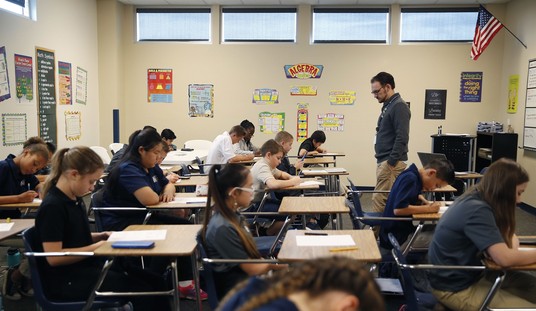Our Equipment is Tired Too
The number of vehicles, arms, bases, and American infrastructure in Iraq is staggering. And the wear and tear on it all is evident everywhere. I wouldn’t be surprised that 30% of our equipment is worn out to the degree that it wouldn’t make sense hauling it back, and would be better off left to help transition the Iraqis. Humvees have sprung doors, broken glass, missing pieces, well in addition to the wear from sand and heat. I think the American people should accept that after Iraq we have an enormous tab to pay to reequip the air force, marines, and army. When you ride in a Ch-46 Frog marine helicopter, or a chugging Humvee or see banged up looking semis, you get some idea of the huge refitting job awaiting us after this is over, I’d say $30-40 billion at least.
Gen. Petraeus
I had an hour conversation with Gen. Petraeus, along with Rich Lowry of National Review, on Thursday evening at Camp Victory. He is trying to reconcile two widely divergent views. Petraeus knows his commanders in the Sunni provinces warn that the good news of calm is tenuous, dependent on good-faith efforts by the Shiite government to allot a fair measure of money to these minority constituencies that have sheltered both al Qaeda and former Baathists.
And yet he accepts that hyper-criticism of the elected Shiite government for their spite and intransigence can prove counterproductive, creating only resentment—especially since it is almost impossible to separate out the deliberate and malicious from simple incompetence within the ministries. An elected government, after all, is sovereign, and we work with those elected by a plurality of Iraq voters.
The result? One must constantly pressure, coax, argue for a Sunni constituency that until very recently was trying to blow apart your own soldiers. And that isn’t easy either. We liberated the Shiites, found them allies against Al Qaeda and Baathists, and now worry more about them than the Sunnis who killed us far more frequently for the first four years—only in Iraq.
Iran came up. Again, a dilemma. Everyone knows Iran is sending lethal copper-tipped IEDs into Iraq, along with agents and cash, to either destroy the country or reduce the government into the status of a puppet state. It gave aid to both Sunni and Shiite militias on the principle that whatever caused turmoil for Iraq could not be bad for Iran.
Solutions? What I gathered from Petraeus is that we have to find a way to stop Iranian infiltration and direct weapons deliveries, perhaps at first by moving our military compounds closer to the border, and getting Iraqis to monitor the intrusions along with us. We must get the Europeans to curb trade and investment; that alone would cripple the theocracy.
What we must be careful about are direct strikes against Iranian weapons’ facilities that would only prompt a terrorist response—or worse—in Iraq. So how one does balance that act—wean the Shiites of Iranian help, have the government rein in the Iranian-backed militias, and convince Baghdad that the new Sunni protection forces are no threat to the government?
Gen. Casey had a brain trust in Iraq, and he set up the counter-insurgency center in Taji. Col. Bill Hix (now in Afghanistan), whom I know well, was on his staff and representative of the highly-educated, talented colonels in the army I wrote about last posting and whom Casey brought with him. I think Petraeus has only accelerated that trend, in getting the likes of Cols McMaster, Kilcullen, MacFarland, and Mansoor all assembled together. No one knows more about the seams of wartime Iraqi alliances than they.
Imagine a university seminar, the professors with sidearms and M-16s at their side, the stakes not a change in curriculum but the life and death of thousands. So one’s final impression of Petraeus is pretty clear: this is about the only person who combines all the experience necessary for this now nearly impossible task. If he cannot pull it off, I don’t think any military commander could.
I found him at times soft-spoken, gruff but polite, blunt, candid, and informed, and generous with his praise of his subordinates. He is a colonel’s general, and represents this effort by the army to bring in those with advanced degrees, who question the status quo, and find that their intellectual skills and education are nearly as important as their military acumen in solving this Byzantine labyrinth of what is now Iraq.
He is not prone to misstatement or bluster or partisanship, and would seem a natural leader that the Democrats could rally behind as well–taking undue credit for demanding changes that led to his appointment. So the tactic of slandering him as we saw last month with the Moveon.org “Be-tray-us” ads is nothing short of political suicide—as the Democrats also belatedly learned who finally distanced themselves from their in-house zealots. But again, this is a mere sideshow, the real challenge being solely can the violence be stopped to allow reconciliation?
Al Qaeda
We sometimes think religion trumps human nature. It doesn’t. Remember the Rafsanjanis of Iran: under the cloak of religious zeal, that crooked clan wormed into businesses and ministries like a Costra Nostra family bent on cash and perks. So too with al Qaeda in Iraq. They are criminals first, pseudo-fundamentalists second. The military knows that well enough since it has seen their pornography, syringes, shake-down schemes, and petty criminality etc. “Al Qaeda” gave a lot of young criminals cover to steal cars, take over houses, and take young girls.
IEDs
Col. Hickey gave a scholarly presentation about IEDs—a frightful weapon that kills randomly, without recourse to reply to the attacker, and quickly instills a sense of dread among those forced to drive over highways seemingly devoid of enemies.
I won’t go into detail, but answers offered are not merely technological since we are in a constant challenge/response cycle against sophisticated enemies, in which the deadlier and more sophisticated mine can gain the edge much more quickly than the commensurate expensively armored vehicle or jamming device. Even the new wedge-bottom marine vehicles (I rode in a MRAP [Mine Resistant Ambush Protected] vehicle and found that it seemed to ride much more cumbersomely than the up-armored Humvee) are very vulnerable to Iranian-machined copper-headed IEDs, as are at times even Abrams tanks. All the jamming gear in the world, and up-armored plating, can’t save our men driving down roads with occasional Iranian IEDs or large al Qaeda brands.
So the answers are found in intelligence, and that means getting the local population to identify the bomb makers, the mules who plant them, the houses where they sleep, and the places where they eat. I think we are winning that race, but the rub is that an exasperated public has zero tolerance for further casualties. So to maintain our pressure on al Qaeda we must suffer almost no losses, and that means almost no IEDs. And even a analyst like Col. Hickey can’t promise that.
Civilians
The number of Defense Intelligence Agency analysts, Provincial Reconstruction teams, investigators from the Pentagon, and mid-level diplomats in transit hourly around Iraq is astonishing. In the present calmer climate, their duties, ironically, can pose even higher risks than combatants, since they hop from one area to another, in convoys and in aircraft, often given tours of the front immediately upon arrival.
I have only the highest regard for all of them—a large number of whom are courageous women—who think nothing of jumping on a Blackhawk to copter up to Fallujah, tour the town, meet Iraqis, write reports, fly back, low and in pitch black night on an Army helicopter, and then repeat the sequence the next day or so.
The Arbitrariness of Death.
Soldiers die in Iraq in very unexpected ways, as is true in all wars. But the line from rear and front is blurred to an astonishing degree, the enemy has no uniforms, and we know sometimes very little about shifting alliances—and who is who on any given week.
Shrapnel can fly into a tent at the hospital in Balad. An overloaded Humvee can careen into a canal. Someone walking in Camp Victory can be mortared. With so many poorly trained Iraqis with so many guns, accidental firings are common. Paid insurgents can mortar into, and drive-away from, even the most fortified target. Listening to the stories of how our 3,800 something have died, I was struck how often death came in moments that were outside “combat,” and involved simply driving, or sleeping, or eating dinner.
There are no fronts in Iraq. That does not mean that a private in a Humvee driving outside Tikrit is not in vastly more danger than a staffer in one of Saddam’s grotesque palaces at Camp Victory—only that the war can be everywhere and nowhere, and no one is immune at any time
One small example of what must be an everyday occurrence. After visiting areas in Anbar deemed active, one hardly thinks that the ten-or-so mile drive from Camp Victory to the tarmac poses much danger.
But on arrival about 7:30 PM, while approaching with two Air Guard pilots our light prop plane, without warning a mortar round landed thirty yards from us. We six (journalist Rich Lowry and two National Guard lieutenants were also there) dived to the tarmac.
All that saved us was that instead of immediately exploding and showering us with shrapnel, the nearby round hit the cement runway obliquely and for some reason skipped before exploding at a safer distance. The entire airport was shut down for considerable time after the attack, and when it reopened we walked over to the impact hole in the tarmac and saw that even without going off immediately, the unexploded round, if aimed just few yards differently into our midst, would have taken at least one of us out.
To stave off defeat, the insurgents, whether ex-Baathists, al-Qaeda, or Shiite militias are embedded within terrorized communities. And they know that while a firefight with a US Marine or Army unit means instant death, an occasional quick rocket or mortar salvo might kill randomly an American—and with that death another headline in a U.S newspaper and another thousand or more citizens back home sick of Iraq, the war, and Iraqis. The war now has increasingly become defined only on the basis of how many of our own die, and that’s the metric the enemy welcomes.
But then after 9/11 we learned there are no fronts, and the worst “battle” still was the first that saw 3,000 incinerated in minutes in Manhattan. Behind all this lies the reality that Islamic radicals and their patrons fear any conventional fight with the US military, be it from the grand scale to the mere skirmish. Their only home is terror and its twin of demoralization and fear.
Final note. After beating this reoccurring stone problem, I hope to make a third visit next year, and see to what degree the Anbar awakening has taken hold.
This trip the general feeling was one of almost abject disbelief that ‘lost’ provinces could suddenly change so quickly. But to sum up: there has been a dramatic change on the battlefield, to such a degree not only is the media largely clueless about it, but our own military is so surprised that it doesn’t wish to make any sweeping predictions.
But if the Sunni transformation continues, this is an historic development that may well tip the scales in our favor—with enormous political ramifications throughout the region, and indeed the world at large. How the Arab world—or indeed our own Left—will handle scenes of former enemy and hard-core Sunni nationalists working side-by-side with Americans I don’t quite know, but it should be interesting…









Join the conversation as a VIP Member